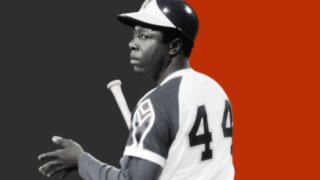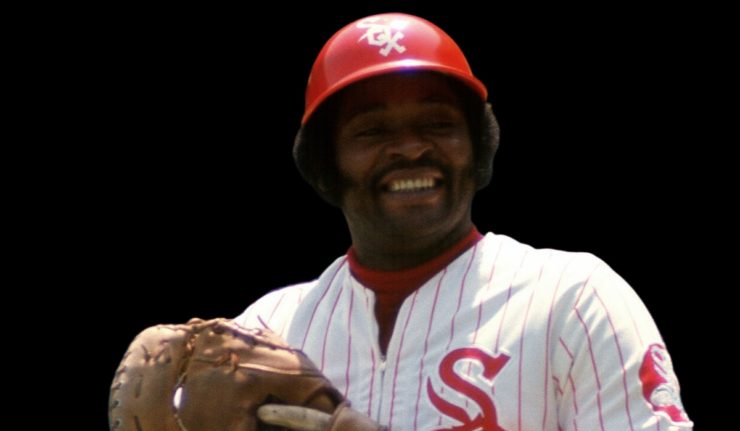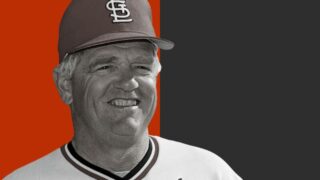In one of his books, Bill James took his hatchet to Dick Allen, and as a result, the prevailing image of the former slugger is as a lazy, selfish malcontent. I’m not sure why James did that, maybe his researchers misled him, maybe he was unable to shake a prejudice he had against Allen. But it was misguided.
James wrote that Allen was “a disruptive presence” in the clubhouse. Chuck Tanner, who managed Allen and would know what was happening in his clubhouse, said in response: “He’s full of shit, and be sure to tell him that.”
Fact is, if Dick Allen was a professional athlete today, none of the controversy he was involved in would be a big deal. Like Muhammad Ali and Jim Brown, Allen matured into a superstar in an era when a black man was not yet considered fully a man in America.
Pride and Prejudice, and the Phillies
Allen was a tremendous baseball player who had the misfortune of coming up through an organization that was indelicate about the issue of race. The Philadelphia Phillies were the last team in their league to integrate. Every step up their minor league ladder was slippery if you were a black man. Allen suffered racial prejudice in the minors, was called names, was not allowed to sleep in the same hotels or eat in the same cafes as his teammates.
“It was as though I wasn’t a human being,” Allen said of being the first African American to play in Little Rock in a desegregated league.
That’s right: Dick Allen was the first black man to play in an integrated league in Little Rock. That’s how different things were when he came into professional ball. But yet, it seems in some ways like little has changed.
The Phillies asked Allen to play third base in the major leagues after having never played the position at any level. When he made 41 errors, he was booed by the fans in Philadelphia, and management didn’t help by their silence. Facing hostile fans who tossed objects from the stands at him, Allen took to wearing a helmet when he was playing on defense. Despite the cocoon he constructed around himself at the ballpark, Allen emerged as one of the elite sluggers of his era.
Outslugged several Hall of Famers
Allen was built a lot like Reggie Jackson: strong shoulders and legs, very athletic. A childhood mishap injured one of Allen’s eyes, which led teammates to call him “Sleepy.” But the young man from Wampum, Pennsylvania never napped in the batters’ box. He was a high average power hitter who stood straight up at the plate and pulled the ball. As a young player, Allen could also run very well.
Allen was a remarkable offensive player:
- From his rookie year through 1974, a span of 11 seasons, Allen ranked second in baseball in slugging to Henry Aaron.
- He ranked fifth in on-base percentage and second in OPS from 1964 to 1974.
- Only six players scored more runs or drove in more runs than Allen during his career and all of them are in the Hall of Fame.
- Allen posted a higher slugging percentage than ten future Hall of Famers who were his contemporaries, including Frank Robinson, Carl Yastrzemski, Willie McCovey, Harmon Killebrew, and Roberto Clemente.
Top 20 First Basemen by the Numbers
This table shows the Wins Above Replacement for the Top 20 First Basemen by our all-time rankings. Note that Dick Allen ranks well above several Hall of Famers in WAR7, WAR5C, and WAR3, as well as Jay Jaffe’s JAWS.
| NAME | HOF | WAR | WAR7 | WAR5C | WAR3 | JAWS |
|---|---|---|---|---|---|---|
| Lou Gehrig | Y | 114.1 | 67.8 | 47.2 | 31.8 | 91.0 |
| Albert Pujols | 99.6 | 61.7 | 44.6 | 27.6 | 80.7 | |
| Jimmie Foxx | Y | 93.1 | 59.5 | 43.0 | 28.6 | 76.3 |
| Johnny Mize | Y | 71.3 | 48.8 | 34.2 | 22.4 | 60.1 |
| Hank Greenberg | Y | 55.7 | 47.7 | 33.8 | 22.5 | 51.7 |
| Frank Thomas | Y | 73.8 | 45.1 | 31.8 | 21.1 | 59.5 |
| Miguel Cabrera | 69.1 | 44.7 | 33.6 | 22.0 | 56.9 | |
| Todd Helton | 61.8 | 46.5 | 37.4 | 25.0 | 54.2 | |
| Jeff Bagwell | Y | 79.9 | 48.3 | 34.5 | 23.4 | 64.1 |
| Willie McCovey | Y | 64.5 | 44.8 | 32.5 | 21.6 | 54.7 |
| Joey Votto | 62.9 | 46.1 | 30.9 | 22.2 | 54.5 | |
| Jim Thome | Y | 72.9 | 41.6 | 26.9 | 20.8 | 57.3 |
| Dick Allen | 58.8 | 45.9 | 31.6 | 24.9 | 52.4 | |
| Eddie Murray | Y | 68.7 | 38.9 | 28.7 | 19.2 | 53.8 |
| George Sisler | Y | 54.0 | 47.2 | 37.1 | 25.3 | 50.6 |
| Keith Hernandez | 60.3 | 41.1 | 28.6 | 20.5 | 50.7 | |
| John Olerud | 58.1 | 39.0 | 27.2 | 21.0 | 48.6 | |
| Will Clark | 56.5 | 36.0 | 28.2 | 20.4 | 46.3 | |
| Paul Goldschmidt | 47.4 | 40.3 | 31.0 | 21.0 | 43.9 |
WAR7 = Best 7 seasons, WAR5C = 5 Best Consecutive Seasons, WAR3 = Best 3 Seasons, JAWS = average of Career WAR and WAR7
At his short peak, Allen was comparable to Jeff Bagwell and Hank Greenberg. For his prime (best five consecutive seasons), he ranks well ahead of Eddie Murray, and he’s comparable to Frank Thomas and Willie McCovey.
His critics say that Allen didn’t have longevity, and he was out of the lineup too much, but Allen’s WAR7 is higher than Thomas, McCovey, Miguel Cabrera, Jim Thome, and once again Murray. Only in career value does Allen come out toward the bottom portion of the list of great first basemen, but he still ranks near Keith Hernandez, who many promote as a top Hall of Fame candidate.
If other peak performers could have their day in Cooperstown, why can’t Allen?
Given how he compares so favorably to the best first basemen of all-time,
If Dick Allen was a “disruptive presence” as Bill James claims, I think more teams would like to find disruptive players.
Difficult Times in Philly
Allen’s manager in Philadelphia was Gene Mauch, whose idea of communication was yelling. Mauch made life miserable for all his players, especially the young Allen, the first black star to play for the franchise. Allen didn’t make it hard for Mauch to bark at him: he broke curfew, he drank too much. Mauch once said of his slugger, using the “little boy” name that Allen despised: “There are only two things you can’t get by Richie Allen. One is a high fastball, and the other [is] a fast highball.”
The more pressure placed on Allen, the more he turned to the bottle. Allen was intelligent and sensitive, and he didn’t take kindly to criticism, even good-natured ribbing could spark his anger. In his fourth season, Allen showed up to a game hungover. He was benched and summarily ridiculed in the press by his manager. Teammate Bill White explained that he played several games with Allen when the latter was drunk or hungover. In those days, a drinking problem was largely kept under wraps. In spite of his elbow-bending, Allen performed at a high level. In one game after a night of partying in Los Angeles, Allen looked foolish at the plate against Sandy Koufax. But to the amazement of White and others, Allen later belted a home run off the great southpaw.
In a famous confrontation, Allen and a teammate got into a fist fight when the veteran teased “Richie” in the batting cage. The bad feelings between the two men stemmed from racial remarks. The media portrayed Allen as the instigator, which weakened his relationship with the fans in Philly.
A decade later, Mike Schmidt had his run-ins with Philly fans, and Steve Carlton never took to the city either. But when those players (both white) faced adversity, the front office nurtured them. Allen never received such generosity.
No matter how much good Allen did with his bat, he never felt comfortable in The City of Brotherly Love. “Sometimes I’m so disgusted, I think I can’t go out to the ballpark,” Allen said. “I love to play, but they don’t make it fun to play. It’s depressing. So, I don’t take batting practice to get away from it.”
The Phillies were so uncooperative toward minorities that in 1969 when Allen was traded to the Cardinals, the man he was traded for, Curt Flood, refused to go to Philadelphia. Despite his success with the team, including a Rookie of the Year Award and four All-Star selections, Allen was ecstatic to be leaving. “I can play third, first, the outfield, anywhere,” Allen said, “but I can’t play in Philadelphia any longer.”
Have Bat, Will Travel
After leaving Philly, Allen played for two teams in two years: the Cardinals and the Dodgers. Neither situation fit: the Cardinals’ ownership was grousing over the changing economics of baseball; the Dodgers didn’t appreciate a player with a strong personality. Allen played well in both uniforms, but at the winter meetings in December 1971, the Dodgers traded him to the White Sox for Tommy John and one other player.
In 1972, for the first time in his professional career, Allen was with an organization that didn’t look at him as a piece of property. He signed the most expensive contract in the sport to play for the White Sox. His manager was Chuck Tanner, who became a surrogate father to Dick. That year, Allen had one of the greatest seasons of the post-expansion years, leading the American League in home runs and runs batted in, and missing a triple crown by five hits. He was named Most Valuable Player in 1972 and played brilliantly for Tanner and the Sox for the next two seasons, when he was healthy. Tanner never had a problem with his superstar, and the White Sox were relevant again.
“He was the leader of the team,” Tanner said. “He taught the kids how to play the game. They loved him, they listened to him. He was the best player I ever had and he should be in the Hall of Fame.”
Allen was blessed with incredible talent. At his peak, when Tanner was writing Dick’s name into his lineup, Allen was an elite four-tool player: hit, hit for power, run, and field. He did amazing things, like the time he hit two inside-the-park home runs in one game, or when he hit a home run off the scoreboard in center field at Comiskey Park. There was a famous incident where Allen was eating a chili dog in the dugout when Tanner summoned him to pinch-hit. Dick scarfed down the dog, getting mustard all over his uniform, then went to the plate and hit a walk-off home run. Or the time he blasted an opposite field homer into the second deck at Yankee Stadium. That came off a pitch that was barely above his shoe tops.
Butcher Job By Sportswriters
Jay Jaffe, a very good baseball writer, repeated James’ mistakes in an article a few years ago for ESPN. In the article, Jaffe claims Allen’s career ended because of his drinking. That’s not only false, it’s blatantly false, and the type of mistake Jaffe doesn’t typically make. Allen’s career ended because of injuries, a fact supported by any number of former teammates.
“Dick retired because he had a bad Achilles tendon suffered in 1974 while playing with the White Sox,” said a Phillies’ groundskeeper named Mark Carfagno. “In fact, he told the Phillies that before they made the trade for him in 1975. They didn’t care, they didn’t let the media know he was injured nor the opposing teams. They wanted him to bat fifth to protect Schmidt and Luzinski.”
What’s sad about the legacy of Dick Allen is that the injustices that hounded him during his playing career have been compounded by an uninformed assault on his character in his retirement by people who should know better.
Dick Allen was surly with the media, moody at times, and too often he was tardy for batting practice. He liked betting on the horses and having a drink, but he could hit the hell out of a baseball, and contrary to his detractors, he was an asset to his teams. Next to Barry Bonds and Shoeless Joe Jackson, he’s the best eligible hitter not in the Hall of Fame.




Great article! He deserved a 12th vote.
He sure did.
Thanks for reading, Brian.
I am reading this the day after he was snubbed again by some moron baseball people who have no idea of the way he played the game. I was at Connie Mack stadium in 1964 when he played his first home game and wow if you knew anything about baseball, you knew he was the real deal. So thanks for writing this and feeling exactly how I felt that day in 1964.
Thanks for reading, Felixx. Yes, it’s unfortunate that the committee could not find a way to elect Allen. It seems to me that the preference for living candidates (Kaat and Oliva) is what kept Allen out this time. The committee members could only vote for up to four candidates.
Dick Allen is definitely HOF worthy. In his very own Teddy-Roosevelt-esque way, he walked softly and carried a big (40-ounce) stick.
I remember seeing him at Veterans Stadium when he returned to the Philadelphia Phillies in the mid-70’s and the crowd welcomed him back with enthusiastic cheers whenever he came up to bat, mostly in a pinch-hitting role.
Growing up in Philadelphia during the 1960’s, there were three athletes who were a cut above not just other Philadelphia athletes, but others in their respective sports. Wilt Chamberlain, Dick Allen, and Joe Frazier. What a privilege to watch their excellence. The hall of fame voters who did not think Dick Allen worthy of the baseball hall of fame are clueless. They should stop paying attention to what sportswriters and broadcasters with a personal agenda against Dick Allen had to say. Talk to those who knew him best. His teammates and those who played against him. They will tell you who Dick Allen was. And what he was and should be: A member of the baseball hall of fame. Terrific article.
Garry, thanks for your excellent comment.
And I’d say Allen is more deserving than Kaat and Oliva
Most definitely, I agree Mike.
Dick allen was and still is the best all around star of the 60s and 70s.from a Sox fan who was on the cat walk between center and right field when he hit the scoreboard at old comiskey. Wake up people. A hall of famers.
Couldn’t agree more.
Dick Allen should undoubtedly be in the Hall of Fame. He is the best player that I ever had the pleasure to watch. Mike Schmidt has his back and I am right there with him in trying to get him in the Hall of Fame.
Hopefully Allen will get the votes some day.
Dick Allen’s career 156 OPS+ ranks him tied for 22nd All Time. The only player who played partially in his era ahead of him is Mickey Mantle , all of the other All Time Greats such as Mays, Aaron and Frank Robinson are behind him. Most of the others from his era who are in the Hall of Fame are so far behind him that they can’t even sniff him. From 1964 to 1964 his 165 OPS+ was the best in all of Baseball as a result he was the most productive offensive player in that time period in All of Baseball. I believe it was Jay Jaffe who said, ” I would never vote a player into the Hall of Fame based on one stat only but in the case of Dick Allen I would. Still today Allen is termed by most baseball Experts and Historians as the Greatest Player Not In the Hall of Fame.
I’ll be 70 July 6,and I’m composing a list of “The Seventy People I Would .LOVE to Kick In Their Boy Bits.” Bill James is VERY NEAR the top of this august ( ?) group .James is mad the the proud and brainy Allen (who roomed with my cousin,Hall-Of-Fame right-handed pitcher Dick Allen as the 1963 Arkansas Travelers’ two first black players;use your imagination as to how they were treated in the Dixie of three generations ago) refused to grin,shuffle and say “Yassuh,bawse” to OB’s cracKKKer leadership and its similarly bigoted,a**-kissing writers. Plus,from 1964-1974,Allen’s OPS was second (by a point) to only WILLIE MAYS’. He wasn’t a good fielder (but not a butcher,as before an arm injury,he could throw at least decently) ,but with ELEVEN successive seasons of almost unmatched offensive prowess,YES, the late,great Dick Allen deserves (and has for decades) a Cooperstown plaque.
Excuse me,Allen roomed with Fergie Jenkins (my cousin) on the ’63 Arkansas Travelers.